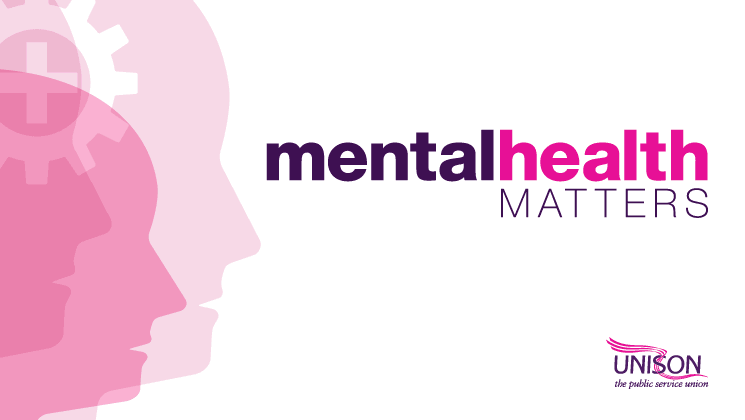“I still feel hopeless.” These are the words of a UNISON member who can’t get the mental help support he needs.
This week is Mental Health Awareness Week. UNISON is campaigning for more funding for across the whole spectrum of mental health services, and as part of a series of articles on the issue we asked to hear about your experiences of these services.
Thank you to everyone who told us their story. We didn’t have space to publish them all, but the common themes were the hard work of mental health staff, unacceptably long waiting lists, and the importance of talking.
Here are a selection of experiences from UNISON members.
“It was sad to see the embarrassed and pitiful look in the eyes of the wonderful consultant psychiatrist as he apologised and told me there’s no support they can offer me”
“I suffer with Asperger’s and autism spectrum disorder. I’m also a trained psychotherapist myself. During the last two years, some of the symptoms of my condition have become more exacerbated, and I’ve approached mental health services for help.
“It was sad to see the embarrassed and pitiful look in the eyes of the wonderful consultant psychiatrist as he apologised and told me there’s no support they can offer me. I see mental health issues becoming a growing problem among my colleagues at work, and among our society as a whole, as communities are increasingly fractured, and more and more pressure is being put on staff in the workplace as well as children in schools.
“I think it’s going to reach crisis point before long, so I’m very grateful for the spotlight your campaign is bringing to the issue.”
“General hospitals aren’t equipped to deal with people with eating disorders”
“My 21-year-old daughter has suffered with anorexia for the last four years, has been in eating disorder units three times now and a general hospital twice. On all occasions, after reaching a ‘healthy’ weight (BMI of 18 or less!), she has been sent home and more or less left to her own devices. No dieticians, little contact with mental health or psychiatric services.
“Is it any wonder she has relapsed back into this dreadful disease each time she has been sent home? I have lost count of the number of times I have tried to get her referred for psychiatric counselling.
“General hospitals aren’t equipped to deal with people with eating disorders, and local eating disorder units won’t take someone with a BMI of less than 15 (my daughter has been – and is currently 12 BMI). So, it’s a catch-22 situation. They are dealing with the symptoms, but not the cause. I feel that she has not been given the mental health support she desperately needs.”
“To get support is next to impossible”
“I was a care manager and I have had to resign my position because I felt my mental health was not positive enough to support people with mental issues. I am still struggling with my mental health even now, but to get support is next to impossible.”
“How can someone manage a mental health specialist unit when they can’t even support their staff when they are having mental health difficulties?”
“I work in a mental health specialist residential unit. When I went off work with anxiety and depression and was off for four months, I was providing sickness certification yet still kept getting calls from my management asking when I was returning and why I was off so long.
“I agreed a phased return plan with my management. When I returned they forced me to do more shifts as ‘the original plan was made up two months ago and things have changed, also we’re short so we really need you to try harder’.
“This was said to me on my first shift back. How can someone manage a mental health specialist unit when they can’t even support their staff when they’re having mental health difficulties?”
“I still have suicidal thoughts daily”
“I have struggled with depression since my teens. I am now in my Forties. Several months ago I was referred to my county crisis team, suffering with major depression and having daily suicidal thoughts. The crisis team recommended I contact local counselling services, saying that they would offer long-term therapy and assessment of my needs.
“After contacting these services I was told that I was too complicated and complex for their services and that I should seek help from secondary mental health services. After discussing this with the crisis team, they advised me that they did not think I would meet the threshold for secondary services. They then took the decision to discharge me. I still have suicidal thoughts daily. I still cry every day. I still feel hopeless.”
“My family and friends find it distressing and inexplicable that services aren’t involved”
“I have been a user of mental services since 2002. Until recently I was supported well by the community mental health team (CMHT), and remained reasonably well and able to work full time.
“Now our CMHT no longer provide on-going long-term support and despite my misgivings I have been discharged. This means that I regularly get into a crisis situation, have to be increasingly supported by my family and friends who find it distressing and inexplicable that services aren’t involved, receive little and often inappropriate support from the crisis team.
“I worry about the long-term implications of this, whether I will be able to continue to work, keep doing the things I enjoy and even whether I will be able to keep myself safe.”
UNISON’s Mental Health Matters campaign
Find out more about Mental Health Week and the Mental Health Foundation







